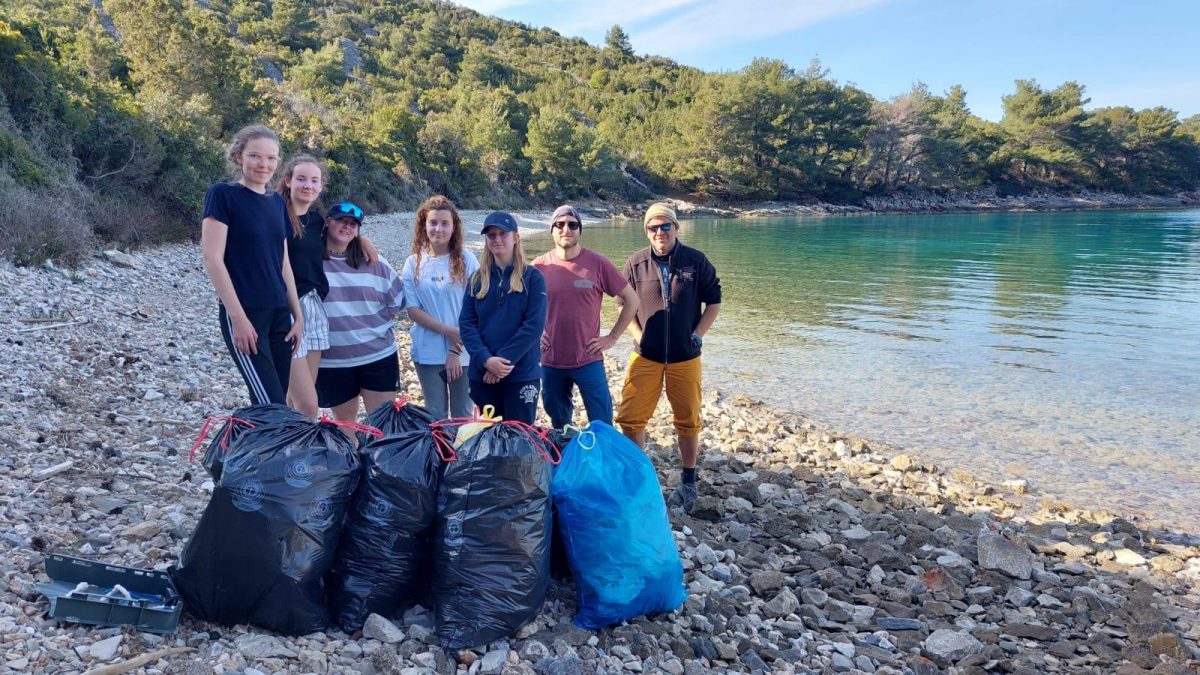Beach Clean Up Collaboration between Landheim Ammersee and Herlufsholm, Salem and Aiglon
Posted: 02 September 2023

Students from Landheim Ammersee School in Germany set out in a sailboat on the Croatian Kornati with the goal of covering all of the six Round Square IDEALS, culminating in a beach clean up. This was a collaboration with other Round Square Schools, Herlufsholm, Salem and Aiglon.
After enlisting the help of an inspirational marine ecologist locally, the group’s ultimate goal was to undertake the beach clean up as their Service Project. Students were well aware that their Service project did not stop when they set foot on home soil but were conscious of continuing with their environmental mindset and trying to make small changes in their everyday lives too. While beach cleans are certainly important, they are only fighting the symptoms and not the underlying problem of pollution itself.
At the start, this international group of students organised themselves (democratically) and planned logistics, for example sharing responsibility for all the meals on the boat. Following instructions by a qualified skipper and a coach, each student would be asked to be the skipper of the day once, practicing their sailing and leadership skills.
Planning
According to Michael Wendell, RS Representative for Landheim Ammersee, planning the conference was not too difficult since the skipper and the coach had already been working together for quite a while, doing sailing and leadership training with various groups (albeit slightly older ones). A marine biologist from Zadar University volunteered to help with guidance of the Environmental Service element. Next Landheim Ammersee reached out to Round Square schools in the wider region who would not require a flight to join the project in Croatia, being mindful of minimising their carbon footprints. Herlufsholm, Salem and Aiglon all jumped at the chance to collaborate with this project.
The crew had a briefing via zoom and learned what to expect for the week then one day prior to the start of the trip, the student delegates arrived in Schondorf. Students went shopping to buy all the ingredients for the planned meals on board, and travelled by car to Croatia in one minivan, as eco-friendly as possible.
Detail
Michael explains that the program and itinerary were set out clearly at the start. This included the meeting with the skipper in the morning, the specific briefing with the student leader of the day and each afternoon there would be a session on leadership with our coach. As for the environmental aspect, we decided to meet with the marine biologist on our first morning in Croatia, right before we would set sails. This way the students already had some idea of what to expect before leaving the harbor. The actual beach clean took place later into the week. This way we would not have to store all the trash bags on the boat for too long, and although we certainly could have cleaned more beaches, two were enough to achieve the intended effect. Approaching the beaches we had chosen, they still looked rather pretty from afar. Only then the students would realize that there was actually quite a lot of trash washed ashore. And after an hour or two they would realize that one could easily go on for many more hours and there would still be trash lying around. This experience then laid the foundation for good discussions on what should be done and changed back home in order to tackle the general problem of plastic pollution.
Challenges
On reflection, Michael explains that planning and organizing this, they faced a few problems. Covid was the most serious one. Corona restrictions had us postpone the trip three times and when it finally worked, one of the students got infected and we had to find a replacement – very short notice. However, these things can always happen. While the crew was very keen on learning how to sail and doing beach cleans, we discovered that – albeit announced – they had no real idea what to expect from the leadership parts. Looking back on it, we probably should have given a more in-depth introduction before the tour started, along with some pre-activities for the students to focus on exactly the issues that would have made it easier for them to be open to the topics and engage more actively in the discussions and assignments. In the end, leadership skills are essential for this kind of project to have the desired effect: for students to go back home and inspire others to share in necessary and positive changes. (Offering the trip during a different time might also help, so older and more mature students can also sign up before the stressful phase of their final exams starts.)
Impact
When asked what the general impact of this conference was and what the learning outcomes were, Michael says that it is still hard to tell what the long-term effects are. Directly following the week, there were both frustrating and thrilling moments for me as the organizer. On the way back on the bus, it was almost disillusioning to see the students buy packs and packs of snacks during our first stop (all in plastic, of course). There was also a lot of online streaming to pass the time during the long bus ride, although we had discussed several other contributors to one’s ecological footprint, pointing out that online streaming takes up huge amounts of energy. On the other hand, old habits are hard to break. Therefore, one shouldn’t be too frustrated and simply keep reminding people, pushing (or rather pulling) them into the right direction and be a good role-model.
Also, there were other moments that made me proud: the presentation of my school’s two participants during a school assembly or the great discussions during a Zoom Postcard clearly showed that the students had taken something with them from this week after all.
We are certainly planning on running this activity again, maybe even once a year. This way we could have a real multiplier effect, more and more students with similar experiences returning to their respective schools and passing on the message. Only then can we start talking about long-term outcomes.
Advice
- If you really want to do a project because you truly believe in it, you simply have to do it.
- There will always be things that don’t go as planned. However, it can never hurt to reach out to others who have done similar activities and who can give advice. The Round Square network is huge and can certainly help.
- If you are planning on running an activity again, it is also essential for all the organizers to sit down together right after the activity and go over everything that could be improved – do it while the thoughts are still fresh. This is what we did in any case. Whether it will really help in improving the conference – only time will tell.
